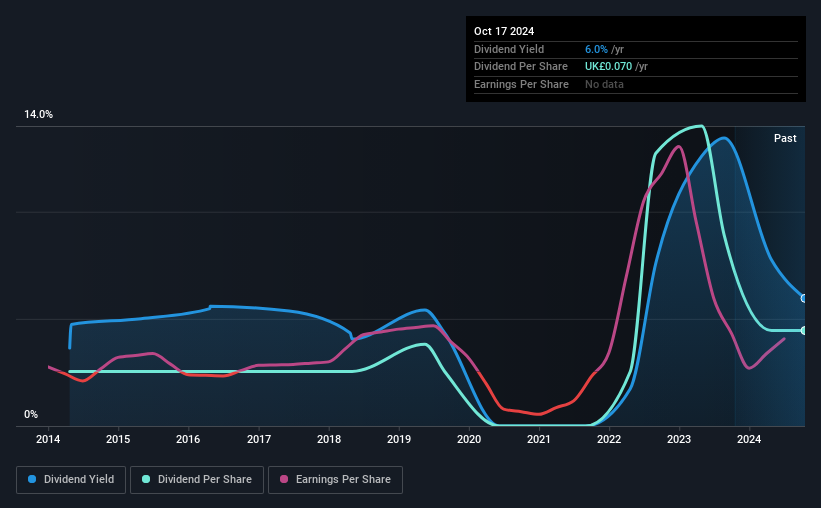Bisichi (LON:BISI) Will Pay A Dividend Of £0.03
The board of Bisichi PLC (LON:BISI) has announced that it will pay a dividend on the 7th of February, with investors receiving £0.03 per share. This payment means that the dividend yield will be 6.0%, which is around the industry average.
While the dividend yield is important for income investors, it is also important to consider any large share price moves, as this will generally outweigh any gains from distributions. Investors will be pleased to see that Bisichi's stock price has increased by 51% in the last 3 months, which is good for shareholders and can also explain a decrease in the dividend yield.
See our latest analysis for Bisichi
Bisichi's Payment Could Potentially Have Solid Earnings Coverage
Solid dividend yields are great, but they only really help us if the payment is sustainable. However, Bisichi's earnings easily cover the dividend. As a result, a large proportion of what it earned was being reinvested back into the business.
EPS is set to fall by 6.5% over the next 12 months if recent trends continue. If the dividend continues along the path it has been on recently, we estimate the payout ratio could be 35%, which is definitely feasible to continue.

Dividend Volatility
The company's dividend history has been marked by instability, with at least one cut in the last 10 years. The annual payment during the last 10 years was £0.04 in 2014, and the most recent fiscal year payment was £0.07. This means that it has been growing its distributions at 5.8% per annum over that time. We like to see dividends have grown at a reasonable rate, but with at least one substantial cut in the payments, we're not certain this dividend stock would be ideal for someone intending to live on the income.
Dividend Growth May Be Hard To Come By
Growing earnings per share could be a mitigating factor when considering the past fluctuations in the dividend. Over the past five years, it looks as though Bisichi's EPS has declined at around 6.5% a year. A modest decline in earnings isn't great, and it makes it quite unlikely that the dividend will grow in the future unless that trend can be reversed.
In Summary
Overall, it's nice to see a consistent dividend payment, but we think that longer term, the current level of payment might be unsustainable. The payments haven't been particularly stable and we don't see huge growth potential, but with the dividend well covered by cash flows it could prove to be reliable over the short term. We would be a touch cautious of relying on this stock primarily for the dividend income.
Investors generally tend to favour companies with a consistent, stable dividend policy as opposed to those operating an irregular one. Still, investors need to consider a host of other factors, apart from dividend payments, when analysing a company. Just as an example, we've come across 4 warning signs for Bisichi you should be aware of, and 1 of them is a bit concerning. Looking for more high-yielding dividend ideas? Try our collection of strong dividend payers.
Have feedback on this article? Concerned about the content? Get in touch with us directly. Alternatively, email editorial-team (at) simplywallst.com.
This article by Simply Wall St is general in nature. We provide commentary based on historical data and analyst forecasts only using an unbiased methodology and our articles are not intended to be financial advice. It does not constitute a recommendation to buy or sell any stock, and does not take account of your objectives, or your financial situation. We aim to bring you long-term focused analysis driven by fundamental data. Note that our analysis may not factor in the latest price-sensitive company announcements or qualitative material. Simply Wall St has no position in any stocks mentioned.
 Index Options
Index Options CME Group
CME Group Nasdaq
Nasdaq Cboe
Cboe TradingView
TradingView Wall Street Journal
Wall Street Journal